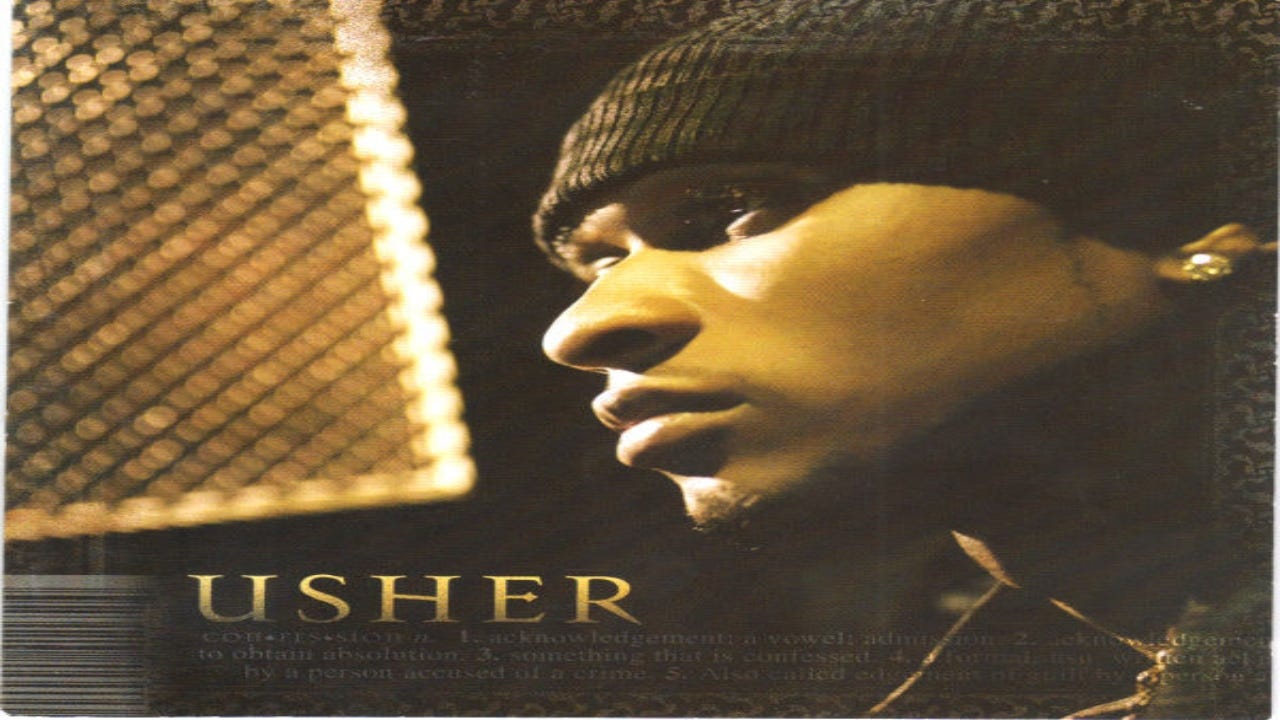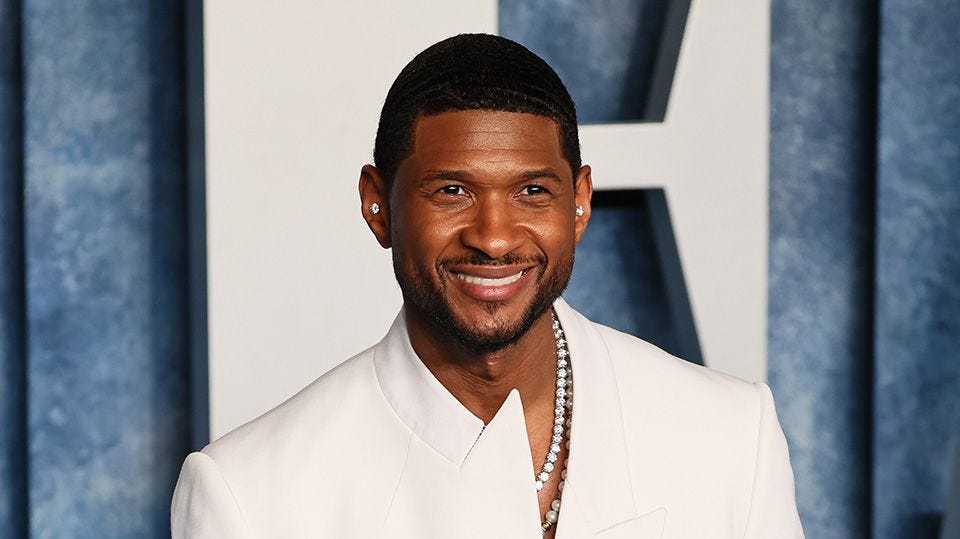Pressure Makes Diamonds: How Usher’s 'Confessions' Became Likely The Last R&B Album To Sell 10 Million Copies
In honor of the 20th anniversary of Usher's "Confessions," DEF|Y|NE Media delves into the factors that propelled it to become a commercial phenomenon, solidifying the R&B singer's icon status.
Usher Raymond was already a bonafide superstar in 2004. With the release of his fourth album, Confessions, he secured his place as pop music’s biggest force and elevated him to icon status.
The album is Raymond’s masterpiece. Earning him four No. 1 hits on the Billboard Hot 100 and three Grammy Awards, Confessions reached rarified air, getting a diamond certification for 10 million units sold. Two decades later, currently sitting at 14x platinum, no other R&B artist has achieved that milestone.
What does it take to go diamond? For an album to sell over 10 million units, many things must happen. Having an album full of great performances of great songs is the very least that must happen.
(Getty Images)
The album shines because its non-singles were so strong, they still became classics for Raymond. Fans gravitate to “Bad Girl,” “Simple Things,” and “Superstar” as much as its hit singles.
Confessions joined an already shortlist of projects from Black male singers to cross the ten million seller threshold: Stevie Wonder’s Songs in the Key of Life, Michael Jackson’s Thriller and Bad, Lionel Richie’s Can’t Slow Down, and Prince’s Purple Rain. Raymond’s Confessions shares commonalities with these other classic releases. For starters, each one caught the increasingly elusive perfect storm of circumstances that led to this rare milestone for Black R&B singers.
MOMENTUM
Wonder’s Songs in the Key of Life was the cap of an peerless creative crescendo that began with albums like Music of My Mind, Talking Book, Innervisions, and Fulfillingness’ First Finale. Jackson’s Thriller came off the back of not only the massive success of Off The Wall, but the popularity of The Jacksons’ Destiny and Triumph albums. After a decade of success with The Commodores, Richie’s Can’t Slow Down was the highly anticipated follow-up to his Grammy-winning self-titled debut. Prince’s Purple Rain rode the back of his commercial breakthrough, 1999.
The success of Confessions stemmed from a commercial and artist momentum that Raymond was riding and working up to that point. His 1994 self-titled debut album performed modestly at best, but songs like “Think of You” show a lot of promise for the teenager.
Raymond’s 1997 sophomore LP, My Way, proved to be his breakthrough. With his voice maturing from adolescence to young adulthood, he displayed his growing confidence on wax, resulting in three top ten singles - “You Make Me Wanna,” “Nice and Slow,” and the title track.
With the release of 2001’s 8701, Raymond achieved a new fame bracket, thanks to more top ten singles like “U Remind Me,” “U Don’t Have to Call,” and “U Got It Bad.” When it came time for a new album campaign, fans were chomping at the bit for a new era of Usher, but what they got was something no one expected.
(Alicia Keys and Usher during their music video, “My Boo,” from Confessions’ special edition.)
IT’S PERSONAL
What makes classic albums stand out against others is when their respective artist dives deep into their soul to mine brooding subject matter that makes for compelling musical storytelling. Thriller connected with audiences thanks in part to Jackson injecting the claustrophobia and paranoia of fame into songs like “Billie Jean” and “Wanna Be Startin’ Somethin’.” Purple Rain seeped in Prince's familiar discord on “When Doves Cry” and his Christian devotion in “Let’s Go Crazy” and “I Would Die 4 U.” Songs in the Key of Life ran the full range of human emotion from the betrayal of “Ordinary Pain,” the fragility of “Isn’t She Lovely,” and social satire of “Village Ghetto Land.”
What made Confessions so compelling was Raymond’s commitment to the drama of his most recent relationship. His love affair with TLC’s Chili was well documented, as was their public breakup. Raymond, with the help of longtime producer Jermaine Dupri, turned these lemons into lemonade.
Although the album featured multiple angles of love and lust, it shined most when Raymond revealed the vulnerability and accountability that came with infidelity (“Confessions Pt. 1 and 2,” and “Truth Hurts”), regret (“Throwback”), and the pain of finally letting go (“Burn”).
CRUNK & BLUES
At the time, hip-hop moved the needle more than almost any other genre. Outkast’s 2003 smash Speakerboxxx/The Love Below went diamond. Lauryn Hill’s lone studio solo album, The Miseducation of Lauryn Hill, achieved 10 million sales four years after its release.
Thanks to hip-hop’s biggest trend at the time, Crunk Music, Raymond found a way to introduce Confessions with a bang. Producer Lil Jon stacked up a string of rowdy anthems like “Get Low” and gave Raymond “Yeah!,” a beat that ripped the clubs to shreds and shot to No. 1 on the Billboard Hot 100.
“Yeah!,” featuring Ludacris, was the red herring that got people to buy Confessions, while the aforementioned emotional songs that connected on a more personal level captivated fans even further.
ONE LAST PUSH
Today, deluxe versions of albums are so normal, that it's becoming comical. From John Legend and Chris Brown to Beyoncé and SZA, everyone drops a special edition of their record months later with a slew of extra tracks to boost sales.
Jackson did it for his Bad album, including “Leave Me Alone” exclusively for CD versions of the album. Raymond would do it for Confessions nearly six months following its initial release. A special edition of the album, including a new cover, dropped with four new songs. One of those songs, “My Boo,” elevated the special edition. The duet with superstar singer/songwriter Alicia Keys became the album’s fourth No. 1 pop hit, helping the re-release of Confessions debut at No. 2 on the Billboard 200 album charts.
OVERCOMING TECHNOLOGY
What makes Raymond’s diamond achievement stand out from the other five men is that Confessions dropped at a time of technological upheaval in the music industry. Songs in the Key of Life, Thriller, Can’t Slow Down, Purple Rain, and Bad all came out within 11 years of each other when physical sales and radio play ruled the roost.
In 2004, the culture was still dealing with the tsunami of MP3 file sharing. Following the introduction of the iPod in 2001, digital downloads started to become more important three years prior, meanwhile, fans were still feverishly downloading songs for free from Napster, and other file-sharing sites.
The MP3 age almost guaranteed that selling 10 million copies of an album, particularly for a Black artist, would be all but impossible. This makes Confessions’ achievement all the more impressive.
(Usher performing at iHeartRadio’s Living Black 2023 Block Party. Photo credit: Kevin Winter/Getty Images)
Today, Raymond’s career is as hot as it was 20 years ago. His wildly successful Las Vegas Residency, his appearance on NPR's “Tiny Desk,” and his highly-rated Super Bowl Halftime Show performance have revived Raymond’s demand and introduced him to a new audience. “Superstar” even became an internet challenge on social media. While Raymond continued to make hits after Confessions, that album afforded him these opportunities and his legendary stature.
With digital streaming now being the main distribution model for music, Confessions could be the last diamond-certified album we see for a long time, if ever. Not a bad record to end an era on, though.
THANK YOU FOR READING! If you enjoyed this piece, please subscribe to my page and share the piece on social media. Thanks again, and stay tuned for more!







